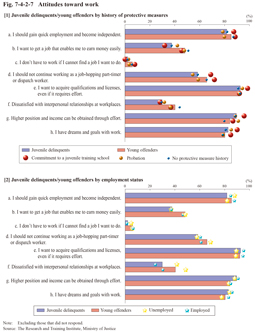7 Attitudes toward work
Fig. 7-4-2-7 shows the attitudes toward work.
With regard to employment and independence after graduating from school, over 80% (81.8%) of juvenile delinquents gave affirmative answers to “I should gain quick employment and become independent” (88.6% gave affirmative answers to “children should become financially independent from their parents early” in the “8th World Youth Awareness Survey”). The percentage of those that gave affirmative answers to “I have dreams and goals with work” (83.1%), “higher position and income can be obtained through effort” (89.6%), and “I want to acquire qualifications and licenses, even if it requires effort” (92.7%) were also high. This indicates that many juvenile delinquents generally have a positive attitude toward social independence through work. However, approximately 40% (37.6%) gave affirmative answers to “I want to get a job that enables me to earn money easily,” showing their tendency to try to choose an easy way, and nearly 30% (29.8%) of them did so to “dissatisfied with interpersonal relationships at workplace.”
As with juvenile delinquents, a positive attitude toward work was also observed with young offenders, in general. With young offenders the percentage of those that had the attitude of wanting to break away from unstable employment (“I should not continue working as a job-hopping part-timer or dispatch worker” (65.8%)) was higher than that with juvenile delinquents (58.4%), but the percentages of those that gave affirmative answers to “I want to get a job that enables me to earn money easily” (48.2%) and “dissatisfied with interpersonal relationships at workplaces” (40.3%) were also higher than with juvenile delinquents, thus indicating that quite a few young offenders had problems with their motivation to work and interpersonal relationships.
With those unemployed at the time of the delinquencies/offenses, the percentage of those that gave affirmative answers to “dissatisfied with interpersonal relationships at workplaces” (41.8% with juvenile delinquents and 49.0% with young offenders) was remarkably higher than with those employed (24.3% and 30.4% (id.)), thus leading to the assumption that many of those unemployed at the time of delinquencies/offenses had interpersonal relationship problems.
Fig. 7-4-2-7 Attitudes toward work
